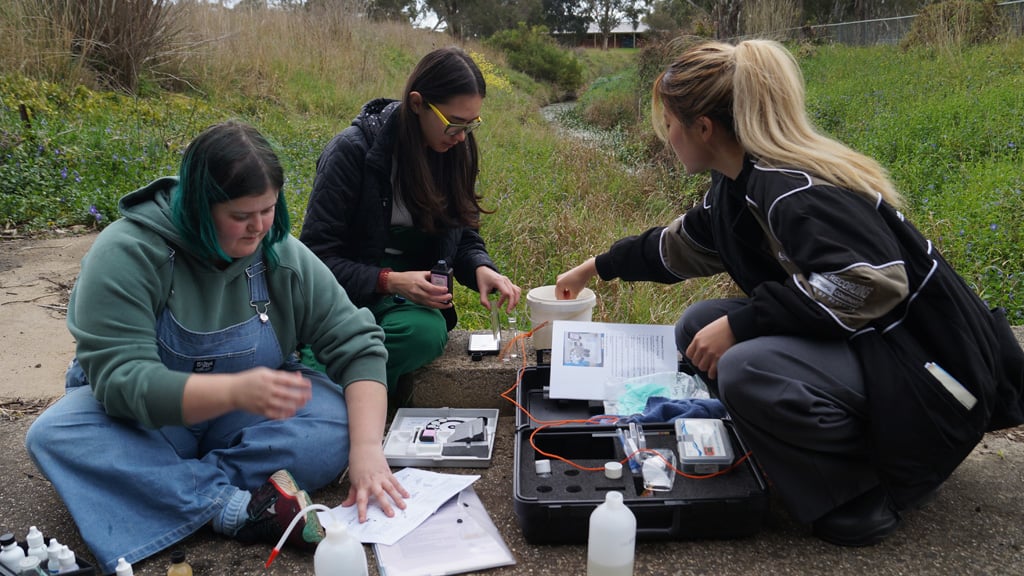See how we’re shaping Deakin campuses to be climate ready
Our Climate Ready Campuses evolved in 2023, with impactful projects bringing to life the climate mitigation, climate adaptation, water, and biodiversity pillars.
Alongside our partners we made significant progress against the University’s Integrated Water Management, waste management and carbon neutrality programs. These meaningful changes have reduced our impact, while preparing our campuses to cope with the predicted changes in climate.
We also established several living laboratories projects, where students contributed to metering audits, water quality monitoring and other real-world learning and research opportunities.
How have we done so far?
Deakin experienced slight increases in emissions, energy consumption, water usage, and waste to landfill compared with 2022 figures. Several factors contributed to this rise; campus usage grew closer to pre-COVID levels, we saw less rainfall than in previous years which resulted in higher irrigation needs, and we expanded waste reporting to include Deakin Downtown for the first time. All figures remained below the 2019 baseline.
While these rises were not unexpected, they are nonetheless an important reminder of the transformative work necessary to reach our 2025 and 2030 commitments.
What projects have been established?
Several initiatives that progressed during 2023 are setting Deakin up for a more sustainable future.
- We worked on mapping our carbon neutrality pathway, so we can understand the work that must happen to reach our CN2025 commitment. Our use of renewable electricity grew, and we analysed our scope three emissions.
- Through the Integrated Water Management Plan, we converted six ponds to wetlands and improved stormwater capacity, water quality and biodiversity in the process. Plus, we put infrastructure in place to connect the Waurn Ponds Campus to recycled water in future years.
- The Resource Recovery Wall at Waurn Ponds also proved successful, introducing a process for students and staff to recycle batteries, phones, and other small e-waste items.
Meet our contributing students
Students and co-founders of the Deakin Ecological Collective, Sunny Syme and Juliet Bao Ngoc Doling, have contributed to the Waterwatch program which monitors the health of the wetlands and creek at Waurn Ponds. Both Sunny and Juliet are currently studying towards their Honours degrees after both completing their Bachelor of Zoology and Animal Science degrees last year.
What are you currently studying?
Sunny: I am doing Honours in Environmental Science and my focus is on freshwater ecology. In my project I am comparing the aquatic biodiversity of man-made versus natural water structures (mainly sampling macroinvertebrates, macrophytes and fish).
Juliet: Currently, I’m pursuing a Bachelor of Science (Honours), and my honours research focuses on modeling the two types of cancers in Tasmanian Devils.
What water management and sustainability projects have you contributed to at Deakin, and what did your role involve?
 Sunny: I joined Deakin Waterwatch shortly after it was created (having previously been part of the EstuaryWatch group in Barwon Heads) and I am now a co-leader of Waterwatch alongside Juliet. We do fortnightly physicochemical testing of the on-campus ponds and Waurn Ponds creek as well as monthly macroinvertebrate surveys of the on-campus ponds. All of our data is uploaded to the CCMA database to be accessed by anybody who is interested in it.
Sunny: I joined Deakin Waterwatch shortly after it was created (having previously been part of the EstuaryWatch group in Barwon Heads) and I am now a co-leader of Waterwatch alongside Juliet. We do fortnightly physicochemical testing of the on-campus ponds and Waurn Ponds creek as well as monthly macroinvertebrate surveys of the on-campus ponds. All of our data is uploaded to the CCMA database to be accessed by anybody who is interested in it.
Juliet: Upon arriving in Australia, my passion for environmentalism led me to seek involvement in Geelong’s environmental initiatives. Joining the Corangamite Catchment Management Authority’s ‘WaterWatch’ citizen science program, I found no local groups in the Geelong area. This prompted me to establish a Waterwatch Group at an old testing site on Waurn Ponds creek near the Waurn Ponds Campus, and I reached out to Deakin to collaborate given the proximity to campus. Over the past two years, the group has evolved to incorporate monitoring of the adjacent wetlands, which have since been revegetated. As founder and leader, my role involves organising and leading monitoring sessions, facilitating collaboration with Deakin, overseeing the group’s activities and most importantly always look for opportunities to grow the group.

Observing a gap between students, researchers, and the broader community, I founded the Deakin Ecological Collective to foster connections and bridge these divides. Serving as its president, I’ve worked to facilitate collaboration and engagement between students, staff, and community members. Despite being a relatively new club, the Deakin Ecological Collective has experienced rapid growth and is actively promoting its primary aim of fostering connections within the university community.
Currently, I’m collaborating with Deakin’s Sustainability team on the Biodiversity Project, aimed at developing a website to monitor wildlife on campus. Involved in the project since its conceptual stages, I’ve contributed to both its development and implementation.
What have been the highlights or your favourite parts of being involved in these projects?
Sunny: For me the biggest highlight is seeing how much progress the ponds have made. We started Waterwatch sampling before the revegetation work had begun and the changes I have witnessed, especially in the upper ponds, have been incredible.
The sites we test were previously pretty bare with turbid water and little biodiversity in the area. Now the water is crystal clear and full of life, the birds are loving the new sites and I have even seen turtles on a few occasions.
Juliet: The most rewarding aspect of being involved in these projects is witnessing the transformative impact they have on individuals’ relationship with the natural world.
It’s incredibly fulfilling to see people become more actively engaged and passionate about environmental stewardship as they participate.
Whether it’s through monitoring water quality, fostering connections within the university community, or contributing to biodiversity conservation efforts, each project serves as a catalyst for positive change. Moreover, seeing the ripple effect of this increased awareness and engagement is truly inspiring. As individuals become more committed to protecting the environment, they often inspire others to join in their efforts, creating a powerful network of environmental advocates and change-makers.
We need your help too!
We need everyone’s support to reach our 2025 and 2030 commitments, and ensure Deakin is playing its part in the transition to a more sustainable world. Our focus for 2024 is reducing waste to landfill, implementing the biodiversity strategy, establishing a social and sustainable procurement framework, and continuing to reduce our carbon emissions. There will be lots of opportunities for staff and students to get involved in these initiatives, so keep an eye out.
There are also everyday actions that we can all take to make a difference. For example…
- Consider how much waste you’re generating. Can you swap out single-use items for reusable ones (e.g. coffee cups)? Do you really need to print that document?
- Make sure your waste is going in the right bin (check out the A-Z Waste List if you’re unsure)
- Try not to over-order lunch to avoid food waste
- Think about your purchase habits, and whether you could choose a supplier who is local, an Indigenous-owned or social enterprise, or has sound sustainability credentials
- Turn off lights and computer monitors
- Take part in sustainability events like Tree Planting Days.
If you have questions or ideas about Deakin’s sustainability commitments, or are interested in getting involved, don’t hesitate to contact [email protected]. Thanks for helping us to become more sustainable.

You must be logged in to post a comment.